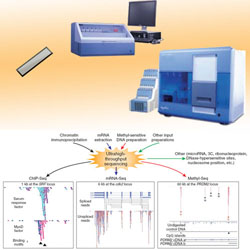Difference between revisions of "Sequencing"
(→Library Prep Services) |
(→Technology) |
||
| Line 11: | Line 11: | ||
= Technology = | = Technology = | ||
| − | The GTC offers Next-Generation sequencing on the Illumina platform. We have two GAII systems and one | + | The GTC offers Next-Generation sequencing on the Illumina platform. We have two GAII systems and one HiSeq which has been upgraded to the 2500 specifications. |
| + | |||
| + | All systems can be run in either Single-Read or Paired-End mode. The GAII systems typically yield 20-30 million reads per lane. The HiSeq standard mode typically yields 120-150 million reads per lane. The GAII and the HiSeq in "standard" mode require 7 full lanes of samples before sequencing can proceed. | ||
| + | |||
| + | The HiSeq 2500 upgrade allows for single samples to be run in "Rapid" mode. These runs can be processed much more quickly without the need to fill 7 lanes in a standard flowcell. Read lengths in Rapid mode are also longer, up to 150x150 and can be completed in a day or two compared to up to two weeks in standard mode. | ||
= Library Prep Services = | = Library Prep Services = | ||
Revision as of 12:27, 9 August 2013
|
Contents
Technology
The GTC offers Next-Generation sequencing on the Illumina platform. We have two GAII systems and one HiSeq which has been upgraded to the 2500 specifications.
All systems can be run in either Single-Read or Paired-End mode. The GAII systems typically yield 20-30 million reads per lane. The HiSeq standard mode typically yields 120-150 million reads per lane. The GAII and the HiSeq in "standard" mode require 7 full lanes of samples before sequencing can proceed.
The HiSeq 2500 upgrade allows for single samples to be run in "Rapid" mode. These runs can be processed much more quickly without the need to fill 7 lanes in a standard flowcell. Read lengths in Rapid mode are also longer, up to 150x150 and can be completed in a day or two compared to up to two weeks in standard mode.
Library Prep Services
We now offer two options for library prep. The "Premium" service is our traditional option built on several years of optimizations we have made to the Illumina "TruSeq" library prep system. This manual protocol is optimal for low-input applications like ChIP-Seq, or RNA-Seq from small numbers of cells. Additionally we now offer a "Basic" library prep option based on the automated library prep methods of the IntegenX Apollo 324 system. This lower cost option works well for genomic DNA or more conventional RNA-Seq applications. Of note for RNA-Seq users is that the Apollo protocol is strand-specific, and offers either poly(A) mRNA isolation or ribosomal depletion to preserve non-coding RNAs. Feel free to contact us to discuss the options in more detail.
Pricing
For pricing information - Click Here
Sample Submission Guidelines
Please use our sample submission forms found here.
Users may submit fully prepared libraries with Illumina adapters or dsDNA or total RNA for our library prep services.
User prepared libraries should be gel-purified and provided UNDILUTED in EB or similar. Please submit 10uL of undiluted sample. We will determine the concentration by RT-PCR and make the appropriate dilutions. Excess sample will be retained in our freezers for potential future re-run. Users are also strongly encouraged to retain a portion of their samples in case of emergency.
For the library prep service please submit dsDNA for the standard protocols or total RNA for the RNA-seq protocol. We will provide all reagents for adapter ligation and enrichment. There is a wide range of suitable volumes and concentrations but we will need to know approximate values.
GTC will provide sequencing primers for libraries prepared with standard Illumina adapters. If custom sequencing primers are required they must be provided at the time of sample submission.
Data
Images acquired from the sequencer are processed through the bundled Illumina image extraction pipeline to get the sequence and quality score for each base. If requested, the reads can be aligned to a reference genome using the Illumina ELAND algorithm. An in-depth QC report is included in the package.
- QC Details - Sequencing
- Formats Details - Sequencing
Turnaround Time
Each sequencer processes 8 lanes per run, or 7 lanes plus a control. Full flowcell submissions (7 lanes) can usually be started within one week of submission. Partial submissions of less than seven lanes are put into a project queue where they join existing samples or await others before processing. Wait times for partial submissions vary but are generally two weeks or less until the START of the run depending on the requested run configuration and demand from other users. The most common run configuration is short (40 bases) and single read. Longer read and paired-end samples may take longer to turn around as there are generally fewer similar samples in the queue to fill out runs. Once a run has started, estimate approximately 1 day per 20 bases for the run and an additional 24-48 hours for data processing. Samples requiring library prep will also take an additional one to two weeks for the prep.
Applications
Next-Generation Sequencing can be used for a wide variety of applications including ChIP-Seq, RNA-Seq, smallRNA-seq, GWAS and much more. Visit Illumina's web site or contact us to discuss your project goals.
